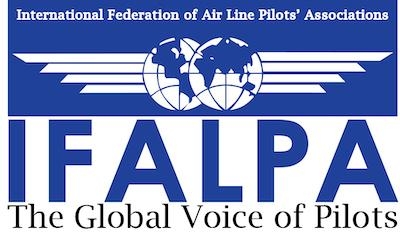Safety vs Profit
On 27 March 2023, leaders of the world’s largest pilot unions and organizations announced a global coalition to prevent airlines and aircraft manufacturers from pushing ahead with short-sighted and specious plans to amend extant Federal Aviation regulation and aircraft type certification protocols to allow single pilot Part 121 aircraft operations.

The notion of removing one of the two pilots currently mandated to occupy the flight decks of airliners is a profit-driven farce that poses demonstrable and significant risks to the safety of both air-travelers and persons on the ground.
Pilot representatives from the Air Line Pilots Association, Int’l (ALPA), the International Federation of Air Line Pilots’ Associations (IFALPA), and the European Cockpit Association (ECA) vowed to take collective action to protect the flying public and counter the aggressive corporate-led lobbying campaign targeting regulators around the world, including the International Civil Aviation Organization (ICAO).
In a recent opinion piece, ALPA President Captain Jason Ambrosi, IFALPA President Captain Jack Netskar, and ECA President Captain Otjan de Bruijn wrote: “Whether you depart from New York, San Francisco, or Atlanta bound for London, Paris, or Tokyo, a crew of at least two qualified, experienced, trained, and rested airline pilots is at the controls on the flight deck of your plane. Every aspect of your flight—the aircraft, its systems, the regulations, and standards that apply to the flight, and the procedures that pilots follow—is deliberately designed for a team working together on the flight deck.”
A 2017 study undertaken by NASA and the Federal Aviation Administration identified unacceptable safety risks posed by single-pilot flight operations—especially during abnormal events and emergencies. Nevertheless, a number of airlines and aircraft manufacturers are currently pressuring international aviation regulatory bodies to reduce the number of pilots conducting Part 121 passenger and cargo flights from two to only one—thereby contemporaneously occasioning an unacceptably low level of redundancy and an unacceptably high level of risk.

Professional pilots embrace and support flight deck technologies by which safety of flight is enhanced; however, the selfsame aviators agree steadfastly and unanimously that removing skilled airmen from the flight decks of Part 121 commercial aircraft—so-called Single Pilot Operations (SPO) or Reduced Crew Operations (RCO)—will serve only to increase risk and compromise safety.
Notwithstanding advances in aircraft automation and improved avionics technologies, two pilots on the flight deck remains the most important safety feature of any transport category aircraft. Pilots eliminate system-failure scenarios, bridge technology gaps, adapt in real-time and in the real environments to unanticipated situations and emergencies—perpetually and perspicaciously acting as critical onboard backups for failed systems. Technology is not, nor shall it ever be, a replacement for a flight deck manned by two human pilots.
A single pilot proceeding from perception of an in-flight abnormality or emergency to corrective action ultimately acts on opinion. Two pilots proceeding together from perception to action ultimately act on consensus. Automation, regardless its sophistication, makes for cold and unsupportive company. When things go weird, a human being cannot look across a flight deck at a pile of servos slaved to a computer and ask, “What do you make of that?”

Psychologists, fools, and airline executives, most of whom have never logged a single flight-hour—drone on about the sticky aspects of human interpersonal relationships. They cite man’s mercurial nature and warn of the adverse effects emotion has on his performance. Man, they contend, is fallible, and must be watched over in perpetuity by infallible machines.
There’s no denying man’s inconstancy. Mutability is the price of sentience. Machines, conversely, are invariable—provided they operate within parameters predetermined by their fallible, human makers. Confronted with the unexpected or unfamiliar, machines fail utterly. As of yet, machines cannot learn—not correlatively anyway, and certainly not on the fly. Abstractions such as inference, interpolation, reasoning, and reckoning remain the sole province of human beings.
The global pilot community, including the Association of Star Alliance Pilots, the Oneworld Cockpit Crew Coalition, and the SkyTeam Pilots Association, are united in the fight against reduced-crew operations and will do everything in their power to ensure that current standards—which have made aviation the world’s safest form of transportation—remain intact and uneroded.
 ANN's Daily Aero-Term (04.26.24): DETRESFA (Distress Phrase)
ANN's Daily Aero-Term (04.26.24): DETRESFA (Distress Phrase) ANN's Daily Aero-Linx (04.26.24)
ANN's Daily Aero-Linx (04.26.24) Airborne 04.22.24: Rotor X Worsens, Airport Fees 4 FNB?, USMC Drone Pilot
Airborne 04.22.24: Rotor X Worsens, Airport Fees 4 FNB?, USMC Drone Pilot Airborne 04.24.24: INTEGRAL E, Elixir USA, M700 RVSM
Airborne 04.24.24: INTEGRAL E, Elixir USA, M700 RVSM Airborne-NextGen 04.23.24: UAVOS UVH 170, magni650 Engine, World eVTOL Directory
Airborne-NextGen 04.23.24: UAVOS UVH 170, magni650 Engine, World eVTOL Directory





